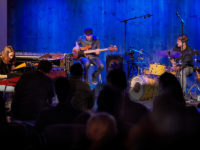Formerly a strictly acoustic pianist, Kait Dunton crossed over into electricland starting with 2018’s trioKait 2. She still goes back to acoustic often, but the wider array of keyboards expanded Dunton’s horizons within the wide, jazz realm.
Accordingly, she’s adjusted her composing style and arrangements to better fit this emphasis on grooves and electrified textures.
Her most recent release Keyboards makes that shift toward contemporary jazz most explicit. Lighter on improvisation and heavier on hooks and grooves, these concise fourteen original tracks are easily embraceable, feel-good music that pays tribute to seventies-styled light funk-jazz that became the gateway drug to the ‘purer’ forms of jazz for many boomers back in the day. Ironically, one could start here and work backward in Dunton’s catalog to take a similar route of discovery.
Backing up Dunton is a slightly revamped trio from the trioKAIT era. Jake Reed remains behind the drum kit but in-demand LA sessionist Sean Hurley (John Mayer, Lana Del Rey, Alanis Morissette, Jason Mraz) is the new fixture at bass.
The Wurlitzer on “Seventy-three” seems to come right out of Joe Sample’s Rainbow Seeker. The sweet sound of the Fender Rhodes defines “Extended Warranty,” a song that evokes prime-era Bob James. Dunton shows off inspired blues licks on “The Lighthouse,” a track that’s just a small horn section short of being a deep cut on The Crusaders’ Southern Comfort. “Mr. Old Skool” is not “My Old School” but it does nonetheless have a chilled, Steely Dan vibe going for it.
When Dunton says “keyboards” she still means her trusty ol’ piano, too. “Lunch Break” reminds us that the acoustic instrument still has a place in the contemporary jazz space and paired with a churchy organ, comes up with some good, greasy gospel funk. That Sunday organ drives the mood for the buoyant “Connie’s In Charge,” too.
Hurley’s liquid, fretless bass lines get “Studio 3” off to a good start, then he makes a nice pocket with Reed for Dunton’s electric piano to thrive inside. Meanwhile, Dunton falls back on her early ability to construct melody with complexity while making it very accessible. Dunton craftily works in organ, piano and Rhodes for “Headspace” but it begins and ends with that Hurley/Reed groove.
In recreating the ’70s sound, Dunton, Reed and Hurley all took care to make their instruments give off that warm, resonant analog sonic imprint, down to the distinctive sound of the snare drum, and that really comes out on songs like “DeLacey.” Speaking of the drums, an alternative mix (subtitled “Super Dead Drums Remix”) takes all the resonance out of that snare, pointing up how just tweaking with the sonics can substantially alter the character of a song. Luckily, “DeLacey” works well either way.
The 91-second “this one’s for you” is the anomaly of the bunch, just Dunton alone on piano spinning a short, soul-stirring gospel ballad.
Kait Dunton has repeatedly proven she can excel with weightier material and arrangements, but now she’s mastered making jazz fun and groovalicious. Because it’s all handmade with an uncluttered classic sound, Keyboards is a guilt-free guilty pleasure.
Get Keyboards at any of the usual outlets, including Bandcamp.




